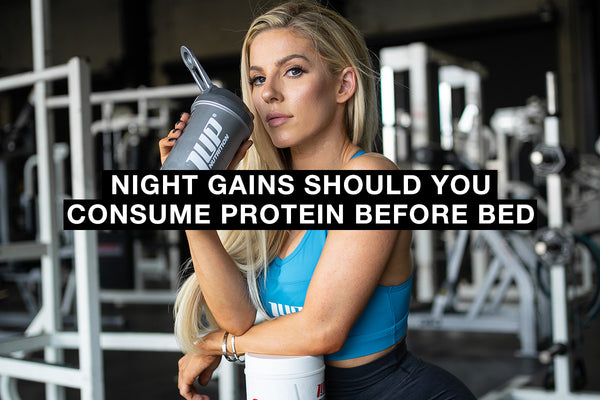Building muscle is a topic that’s pretty basic in theory, but if you spend even a modicum of time reading, watching, or scrolling through various things on the internet and social media, you’ll be more confused than ever.
Should you train with high volume or low volume?
Heavy weights or lighter weights?
Full body? Bro split? Upper/ Lower?
Should you train to failure or not?
The debates are endless
At its core though, building lean muscle entails a few simple principles.
- Perform resistance training 3-4 times per week utilizing progressive overload
- Consume a modest surplus of calories (~10-15% above maintenance)
- Consume enough protein daily (~1 gram per pound of bodyweight / day)
- Get enough sleep
- Use the right supplements
When these principles are applied consistently over time, you will get the results you want during your transformation challenge.
Still, for those looking to optimize their results, accelerate their progress, or bust a plateau, they will try to tweak the above pillars of muscle building. The most notable one (i.e. the most hotly debated topic) centers around nutrient timing -- the intake of certain nutrients at certain times of day to facilitate a desired outcome.
In the case of building muscle, many argue that nutrient timing is essential to optimize results. And, in addition to consuming protein in the post-workout window, it’s also frequently promoted that you must consume protein (typically casein or cottage cheese) before bed.
The thinking behind eating before bed is that it keeps your body “anabolic” while you sleep and keeps any muscle breakdown at bay during the 8 or so hours that you sleep.
But, is this really necessary?
Let’s discuss.
The Basics of Building Muscle
Protein supplies the body with amino acids, including essential amino acids and BCAAs, which it uses to repair and grow lean muscle as well as support a variety of other biological processes, including hormone production, neurotransmitter synthesis, hair, skin & nail growth, and immune function.
The body is constantly both building new proteins (anabolism) and breaking down protein (catabolism).
And, the delicate balance between anabolism and catabolism is what ultimately determines whether you’re building muscle or not.
Quite simply, in order to build muscle, anabolism needs to exceed catabolism.
In other words, your body has to build more protein (i.e. muscle) than it breaks down over time. In this net anabolic state for a prolonged period of time (weeks, months, years), you build muscle.
The next question becomes -- how do you promote a net anabolic environment whereby your body is building up more protein than it’s breaking down each day.
The answer to that is pretty simple -- perform resistance training and consume enough protein each day.[1]
This dynamic duo is the key to maintaining an anabolic environment. One other thing you can do to further tilt that scales of muscle growth in your favor is to consume carbohydrates as carbohydrates increase insulin, which itself exerts powerful anti-catabolic effects in the body.
So, the combination of resistance training and adequate protein intake to boost anabolism coupled with the catabolic-suppressing actions of insulin is a recipe for success if your goal is to maximize your muscle building potential.
Now that we’ve got the “big picture” factors taken care of (resistance training, protein intake, etc.), it’s time to dial in the finer points of what it takes to really take your transformation challenge results to the next level.
Should You Consume Protein Before Bed for Muscle Growth?
We’ve already stated a few times that consuming enough protein each day is essential for muscle growth, but is it good enough to just consume your daily protein needs all in one sitting or should you distribute it throughout the day?
Current best-practices (which is also backed by research) is to evenly distribute your protein intake throughout the day between 3-6 meals, depending on calorie needs and lifestyle factors.
You see, the body doesn’t have a way to store protein/amino acids for considerable lengths of time as it does carbohydrates (glycogen) or fats (adipose tissue).
Consuming protein every 4-5 hours provides a steady influx of essential amino acids into the bloodstream which spikes muscle protein synthesis and keeps your body’s innate muscle building machinery running on all cylinders.[3]
Bodybuilders and physique athletes have been doing this already for decades, but it’s always nice to see the research back up what the pros and bros have been doing.
So, to recap, the “big picture” idea is to make sure you’re consuming enough protein each day. Going a little bit deeper, it’s a good idea to evenly distribute your protein intake across several meals evenly spaced throughout the day.
This brings us to the main point of the article -- should you consume protein before bed?
By that, we mean does consuming protein before bed confer a specific advantage towards muscle growth and recovery that couldn’t be obtained simply by hitting your protein needs during the rest of the day?
Well, the body of research is pretty scant in this area, though bodybuilders have been promoting the idea for years that consuming some sort of protein (usually cottage cheese or casein) before bed is essential to stave off catabolism during sleep since your body will be going without food for between 7-9 hours.
And, it’s true, if you do consume protein pre-sleep, protein synthesis rates will be elevated...but in the greater context of consuming adequate protein throughout the day, does consuming pre-sleep protein enhance muscle recovery and growth to any greater extent?
A 2019 review that assessed the effects of pre-bed protein supplementation on muscle growth concluded[4]:
“...this beneficial effect on pre-sleep protein ingestion on muscle mass and strength gain during resistance-type exercise training are due to an increased total protein intake rather than by its specific timing remains elusive, and warrants further research.”
Essentially, the authors conclude that pre-sleep protein intake supports muscle growth as a result of helping individuals hit their daily protein goals, not necessarily because there is some magic to consuming protein immediately before you sleep.
So, if you’re already consuming adequate protein throughout the day, there’s no need to stress about making sure you have a protein shake or full meal before bed.
Now, don’t take this to mean that consuming protein before bed will harm or hinder your results (it won’t). In fact, there is some research to indicate that consuming some pre-sleep protein may actually enhance fat oxidation (which may be beneficial for those of you looking to lose weight).
And, if you are someone who struggles to get in enough protein during the day, or someone who struggles with late night munchies, consuming protein before bed can help to improve protein intake distribution over the day and help keep cravings in check.[4]
Best Pre-Sleep Protein Options for Building Muscle
Cottage cheese and casein protein are age-old favorites as a source of pre-sleep protein due to the fact that casein protein (which also happens to be the main protein in cottage cheese) is incredibly slow-digesting. In fact, some research indicates that it takes between 7-8 hours for the body to fully digest casein, which provides a very long and sustained drip of amino acids into the bloodstream.
Truth be told, any complete protein source will get the job done. Cottage cheese and casein are great options, but so too are:
- Lean beef
- Chicken
- Turkey
- Pork
- Fish
- Shellfish
- Eggs
- Yogurt
- Milk
- Cheese
One of our favorite combinations for a pre-bed protein-rich snack is to mix a serving of either 1UP Whey Protein or 1UP Organic Vegan Protein into a bowl of yogurt and top it with berries (fresh or frozen) and a serving of chopped nuts. This quick-fix meal is rich in protein, healthy carbs, fiber, and healthy fats that supplies the body with everything it needs to support recovery and growth while you sleep.
So, When Should You Consume Protein?
With the increased focus on workouts today, there's also more confusion than ever as to when supplements and protein should be consumed. Some may assume that because it's known as a workout protein, you'll need to consume that protein during your workout.
But that's not necessarily true. In general, you can consume workout protein before, during or after your workout to achieve the benefits, regardless of whether you're looking to build muscle, lose weight or you're just looking to maintain. While many may decide to consume those protein bars or they make take a Women's or Men's pre-workout protein to help them get through that next workout, the most important piece for most people is that you're getting the right amount of calories and protein for your activity level and goals.
It's also a function of how you'd like to organize and plan your workouts. If you're someone that needs a bit of pep and energy to get through a workout, you may want to opt for consuming a workout protein shake or bar prior to your workout, giving you the energy and fuel you need to have a great workout.
Others may opt for consuming a workout protein during a workout, reasoning that as long as they're working out they might as well hit that nutrition requirement. Still others may prefer to consume their workout protein after a strenuous workout, giving them some time to relax and get the nutrition they need to build muscle and optimize the function of the body.
No one approach is necessarily best, and you'll just have to go with the workout protein regimen that works for you and your needs. The only real concern is that you're getting enough protein and calories each and every day -- even on your days off -- so that you can continue to work towards your health and fitness goals. Generally, the fitness window for the benefits of workout proteins is much larger than many people suggest, and hitting the right amount of protein each day is more important than when you may take it.
References
- Brook, M. S., et al. Skeletal muscle hypertrophy adaptations predominate in the early stages of resistance exercise training, matching deuterium oxide-derived measures of muscle protein synthesis and mechanistic target of rapamycin complex 1 signaling. FASEB J. 2015 Nov;29(11):4485-96.
- Morton RW, Murphy KT, McKellar SR, et al. A systematic review, meta-analysis and meta-regression of the effect of protein supplementation on resistance training-induced gains in muscle mass and strength in healthy adults. British Journal of Sports Medicine 2018;52:376-384.
- Schoenfeld, B.J., Aragon, A.A. How much protein can the body use in a single meal for muscle-building? Implications for daily protein distribution.J Int Soc Sports Nutr 15, 10 (2018). https://doi.org/10.1186/s12970-018-0215-1
- Tim Snijders, Jorn Trommelen, Imre W. K. Kouw, Andrew M. Holwerda, Lex B. Verdijk, Luc J. C. van Loon. The Impact of Pre-sleep Protein Ingestion on the Skeletal Muscle Adaptive Response to Exercise in Humans: An Update. Frontiers in Nutrition, 2019; 6 DOI: 10.3389/fnut.2019.00017






